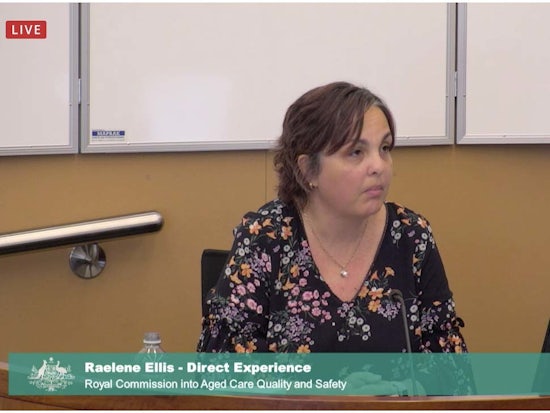ROYAL COMMISSION: Focus on home care supports
Hearings for the Royal Commission into Aged Care re-commenced in Adelaide yesterday, with a spotlight to be shown on in-home care and supports over the next five days.

Raelene Ellis shared her story as an informal carer to her 78 year old mother living with dementia
Senior Counsel Assisting Dr Timothy McEvoy opened the hearings with a detailed recap of last month’s Royal Commission hearings before highlighting key issues to be covered this week including fees of home care, workforce and the impact of wait lists on recipients.
Monday’s witnesses spoke of their direct experiences with home care services for themselves or their loved one.
Dr Timothy McEvoy says as of February 28, 128,495 older Australians are not receiving any home care packages or package level of care they had been approved for, an experience Raelene Ellis knows too well.
Impact of waiting times and being ‘kicked out’ of respite
Ms Ellis detailed the emotional turmoil faced by informal carers as her 78 year old mother who has dementia was kicked out of a respite facility after being hospitalised for pneumonia.
She says she has been waiting for a home care package for her mum since 2014, when she noticed a significant decline in her mother’s health.
Initially, Ms Ellis’ mum was assessed for a Level 1-2 home care package but this was upgraded following a fall in her backyard in 2015, which saw her break her C4 vertebrae in her neck.
She was eventually approved for a Level 3 package in May 2016 but finding providers proved the next challenge.
“I accessed the My Aged Care website and it would say there were Level 3-4 packages available from certain providers and they would have no packages available,” Ms Ellis says.
“We have enough money in our society to be able to care for everyone.
“Someone shouldn’t be have to be told when the next person dies, you can get help but until then, tough bikkies, you can’t.”
After being told her mum was next on the list to receive a home care package, the waiting list became nationalised.
“It was very frustrating to go from knowing that my mum was next on the list to receive a Level 4 package, to then all of a sudden having completely no idea where on the list mum was, how long we would be waiting for this extra help,” Ms Ellis adds.
“In the meantime, mum’s health was rapidly deteriorating.”
But when the family finally got news a Level 4 package was available, Ms Ellis’ “sense of relief” was met with disbelief as over $50,000 worth of care equated to nine hours of support per week.
When looking at the breakdown of her mother’s package, Ms Ellis says she believes the high administration fees meant the provider got paid twice.
“I equated it to, I think, just over $20,000 that was going just for their administration, which left about $30,000 for the actual care of the individual.”
“Where is the money going? Because $50,000 should not translate to just nine hours of care.”
Ms Ellis also recalls how in order to receive the Dementia Supplement, her mum was asked to undergo a further assessment costing $80, despite already having a confirmed diagnosis.
“I wonder whether there are other people out there who are just not applying for the Dementia Supplement because they don’t want to pay that $80.”
As Ms Ellis and her family took a much-needed break, her mum was accessing respite at Opal Aged Care when she had a bout of pneumonia.
“I didn’t see her for about five days and by five days she was significantly ill.
“She was lying on sheets that were stained with urine.
“I had spoken to them about, you know, why an ambulance hadn’t been called.”
However, when eventually being discharged from hospital some 40 hours later, Ms Ellis received a phone call from Opal Aged Care saying their respite agreement had been terminated.
“They could have done it [held the room] if they wanted too but the priority was money over my mum.”
She says although she had been discussing permanency with the provider, it was a tough decision that required both time and research.
“If these people are providing that care, they need to have an understanding of that because it’s not a decision that I want to make for my mum.”
“But the result of that decision was that mum then became homeless.”
Ms Ellis says she is exhausted and believes more needs to be done to support informal carers.
“The solution is that there just needs to be a legislative change to allow someone to take leave from respite for hospital admissions.
“What we need is a real support network.
“Being an informal carer is hard and I think there just needs to be a reflection of that in the system as well.
Therese lives in a different residential aged care facility and is now bedridden, requiring two people to move her.
Ms Ellis says more support and compassion required in aged care.
“We’re really struggling to this day.”
“I don’t think that we ever really received the care that she needed.”
“The aged care system is happening in the back drop really of people’s significant health decline.
“This is a system that is being provided to people that are already in crisis.”
“Bottom feeder” providers
A witness from the Department of Health believes many providers see home care as a means of making money, with little interest in ensuring the safety and care of older Australians, describing them as “bottom feeder applicants”.
“There’s a very large cohort of companies that I believe see home care as a business opportunity, and not much more than that.
“The reason I refer to them as “bottom feeders” is the quality of their applications is so poor, it is so obvious that they have not even taken the time to read the guidance for applicants.
“They don’t understand what their responsibilities would be as an approved provider.
The witness says previous “bottom feeder” applications have included references to residential aged care and legislation and guidelines that no longer exist.
She says these substandard applications are burdening department staff who are processing as many as 13 provider applications at a time, with each application taking two weeks to process.
“It makes my team angry that we have to spend extraordinary amounts of time keeping these people out of the sector because, as I’ve said previously, I believe that they’re dangerous.”
“It’s frightening to me that there’s so many of them out there.”
The witness told the Commission eight out of 10 provider applications would fall into the “bottom feeder” category.
“My guess is eight out of 10 of what I look at is rubbish.”
She also says the home care reforms which came into effect on February 2017 particularly once the Aged Care Approvals Round (ACAR) have had devastating consequences to the quality of care available and created a “free-for-all” attitude amongst provider applicants.
“I think it was just seen as a big business opportunity to get in and make some money.”
Hearings for the Royal Commission into Aged Care continued today.











![The new Aged Care Act exposure draft is slated for release in December of 2023, but advocates hope to see it rolled out on January 1, 2024. [Source: Shutterstock]](https://agedcareguide-assets.imgix.net/news/articles/wp/agedcareact__0811.jpg?fm=pjpg&w=520&format=auto&q=65)












Comments